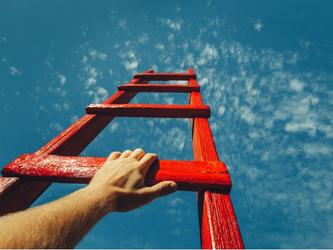Bump in the road: How insights professionals can learn from setbacks
“I lost two jobs over the course of about two-and-a-half years and, to be honest, both times I eventually saw it as a great life opportunity, though how soon after varied between the jobs.”
Peter Lane, who now works in user research at YuLife, tells us that the first job was lost because of the financial fallout from the Covid-19 lockdown, which resulted in him being made redundant, followed by a period of freelance work. The second was a dream role that turned sour.
“The dream quickly faded; there was mounting pressure on me and I was out of my depth, writing and editing at pace, and in bulk,” says Lane. “Stress mounted and I became increasingly anxious. After a few months, they pulled the plug. This was both a knock to my confidence and a kind of relief – at first from the stress and then, more slowly, a relief that I had given it, my ‘dream’, a go, ticked the box, and could move on.”
Setbacks happen in all walks of life and, at some point, most people will face challenges and deem themselves to have failed, or not have achieved the success they expect. Regardless of whether setbacks are work-related or rooted in personal life, they can be difficult to navigate.
What went right?
Zoe Fenn, founder at You Burn Bright, is a leadership coach for research agencies, who launched her own business after being made redundant. She says that the first step is reassessing your relationship with ‘failure’. “We say success or failure, but they are too ends of an extreme and there is so much in the middle,” she explains. “The reality of a setback is that it is often somewhere in the middle. One strategy is to identify what element was actually a failure – there will have been a lot of things that have gone well.”
There is a difference between a failure in terms of something you did that you want to do differently, and something not going your way, she adds. “There’s so much good you can take from the experience of trying. If we get too attached to an outcome and not wanting to fail, we stop going for things.”
Other setbacks can simply be the result of changing circumstances. Sinead Jefferies, senior vice-president at Zappi, moved to France eight years ago and went freelance, before returning to agency life last year. Freelance was great at the beginning, she says, but that changed over time.
“I got to a point where I didn’t always love what I was doing,” Jefferies says. “I worked on some amazing projects, but I also ended up doing some stuff that I thought was 10 years ago in my career, not now, which was a bit frustrating. I also felt lonely and on my own, having to continue to make connections to find the next project. The upsides I got from the flexibility and freedom started not to be worth it.”
Jefferies says she would not take back her time as a freelancer, but feels she is now in her ideal work environment. “There’s something to be said for the learning you get from those experiences,” she adds. “If you make a decision about your career for reasons that are, at the time, important to you and feels like the right thing to do, you will always get something from that.”
Growing pains
The shift into a management role can also cause setbacks for some, as in the case of Hannah Rogers, business development director at Kokoro. In a previous role, she says she had to adjust to the new demands of management and change her approach following feedback from a more junior colleague after a request to work on a new methodology.
“I couldn’t understand that, for them, it wasn’t easy and was scary – they didn’t have the benefit of experience,” Rogers says. “I hadn’t explained it very well, appreciated their fear, or understood that – if a senior director asks them to do something – they wouldn’t want to let me down and would be worried about their career prospects [if they didn’t understand something].”
It is important for senior staff and employees to have honest conversations and move beyond hierarchical constraints, according to wellbeing coach James Pickles.
“When managers and team leaders are checking in with their team, we need to break the pattern of the ‘fine thanks, how are you?’ game,” he says. “If a manager genuinely wants to check in with someone, someone has to go first, and that someone will probably have to be the more senior of the two. To ask someone to open up, you might have to give a little bit to create a trusting environment.”
Pickles recommends talking through any issues with others to help address underlying problems. “Find somebody you feel comfortable and safe talking it through with,” he says. “It is the opposite of what most people do, which is some form of struggle in silence. Remain silent until you find, by yourself, the solution to it.
“Find someone you can have a conversation with about the issue – not a conversation that asks for advice necessarily, because to be receptive to advice you have to have a real grip on the problem. People put pressure on themselves to have real clarity before we speak up, and that prevents us from speaking openly in order to get clarity.”
Perhaps most importantly, concludes Fenn, is making sure that you take feedback well from any conversations that you have, and think about any lessons that can be gleaned from a setback.
“It is about getting as much information as you can, asking questions and understanding what you need to demonstrate,” she says. “Do I want to be right, or do I want to learn and develop?”
The ability to learn from past problems is key, adds Lane, who recovered from his previous two experiences to return to the world of research in his current role. “You must see it as an opportunity to learn about yourself. For me, it was a chance to test and validate what I do and don’t like. I’d recommend anyone who loses their job to try a few things that they couldn’t do when they were in work.
“Taking this sort of attitude, of learning from experiences and seeing it all as a test, is a really valuable life lesson.”
This article was first published in Impact.

We hope you enjoyed this article.
Research Live is published by MRS.
The Market Research Society (MRS) exists to promote and protect the research sector, showcasing how research delivers impact for businesses and government.
Members of MRS enjoy many benefits including tailoured policy guidance, discounts on training and conferences, and access to member-only content.
For example, there's an archive of winning case studies from over a decade of MRS Awards.
Find out more about the benefits of joining MRS here.














0 Comments